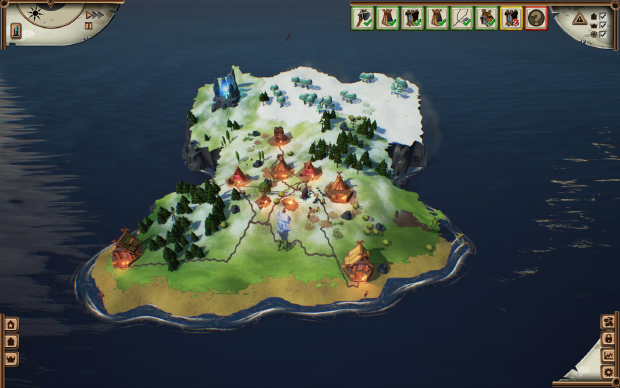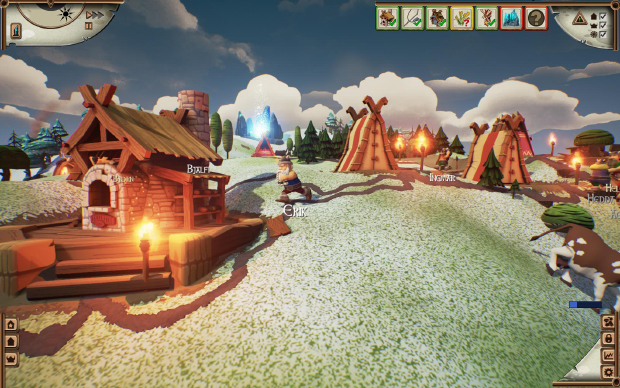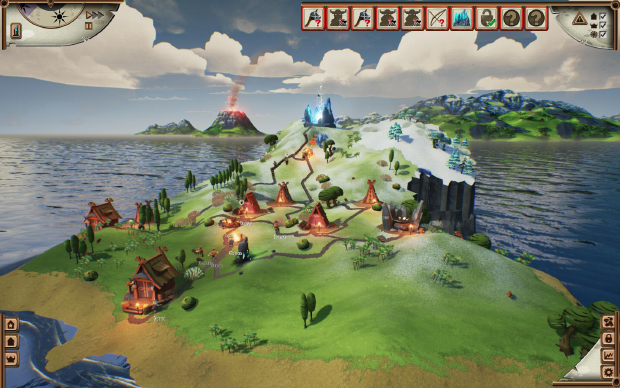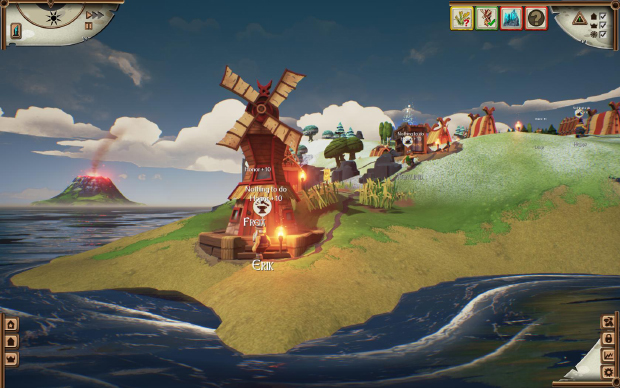Premature Evaluation: Valhalla Hills
Loki's low-key loci
Each week Marsh Davies attempts to prove his valour beneath the baleful eye of the gods, venturing into the frigid wastes of Early Access and coming back with any sagas he can find. This week he’s been playing Valhalla Hills, a jolly village-building god-game with a Nordic theme.
You and your pet Viking tribe have been banned from the afterlife for being insufficiently heroic. The only way you’re getting back into Odin’s good graces, and so into Valhalla’s eternal drinking hall, is by, er, building a succession of pertly idyllic hamlets with well-supplied bakeries and breweries. It’s an odd definition of heroism, but as someone whose greatest accolades cap out at “makes nice bread” and “drinks too much beer”, I’m willing to take it. There’s a bit of fighting, too, in Valhalla Hills, though it’s often optional: to get to the next island you have to open a portal, usually placed on some icy crag and guarded by ferocious monsters. They can, however, be placated by building an altar and sacrificing crafting materials upon it - and this seems to be a much, much easier option than equipping a militia and supplying them as they travel up the mountain.
But it’s also not nearly as fun. Even if the amount of resources required in sacrifice were substantial, it would only be a matter of waiting for your various production lines to churn through the order. As it is, for the first four hours of the game, they are invariably trivial by comparison to the resources required to field an army. I suspect the sacrifice route might be a sort of soft fail-state, allowing the player to progress but not feeling especially good about it. Though I wouldn’t say that building an army is exactly hard either - mostly it is a matter of methodical progress as one building enables the acquisition of a resource that enables another, and so on - but there’s some thought required in placing courier outposts and supply points to ensure your berserkers keep their bellies full of beer and bread.
When I say it isn’t hard, I am not really making a complaint. There is a satisfaction in seeing these little people with their own whims trundle about, pursuing whatever impulse they have: to find a bed to sleep under, or something to eat, or a piece of rock with which to fashion a crude axe. Sometimes they get bored and go and have a chat by the bonfire. You have no direct control over them: instruct them to build a logging cabin and they will assign vikings to do the work, and then someone to run it once it’s complete, automatically seeking whatever resources are required in the process. Usually they are smart about this, but it can occasionally be frustrating to be at the mercy of the AI. When I required more archers for my newly-formed militia a viking named Skorri signed himself up and promptly set about sourcing the materials to make a bow all by himself. But he then got caught in a loop of indecision, wandering back and forth, picking up sticks then dropping them, again and again, periodically getting distracted by the demands of his belly.
Fortunately, the moment-to-moment interests of a viking are quite easy to parse - thought bubbles indicate their current intention, but clicking on one also gives you a readout of their profession, their stamina, their hunger, and any inventory they are carrying. Although from a distance Skorri’s behaviour was bizarre, I was able to diagnose the problem: he was unable to find the animal materials to fashion the bow-string near the militia’s campsite, and so started running back to town to find one. But then he’d turn round. Clicking on the militia camp to which he was assigned, I realised his pathfinding was hitting the perimeter of its field of influence. Each building has one, indicating the distance the building’s assigned workers will travel to collect resources (though, peculiarly, this doesn’t consistently seem to matter - bakeries appear to source flour from way across the map if necessary).
The terrain, which is procedurally generated, often restricts where you can build, and so you’ll need to drop smaller supply points between buildings to ensure resources are collected and redistributed across your settlement. In theory, the supply point between the militia camp and the village should have been staffed by a viking who would acknowledge Skorri’s need and go himself to fulfill it - but I could see he was busy trying to make himself a backpack. I could have just waited it out, but I solved the problem quite simply by temporarily relocating the militia camp (which is one of the game’s few freely moveable structures) closer to town. I felt pretty smart about the whole thing, if not exactly heroic.
This is, however, is one of the only moments of friction I’ve encountered in the game so far. The process of urban sprawl is pleasing to watch as its systems interlock and resources are sought, harvested, consumed or transmuted by its colony of busy workers. It expresses a modest amount of strategic thought, too - realising you should put the mason near an outcrop of rock is no particular intellectual challenge, but being exact enough in your placement that you can easily supply the rest of your village, or leave enough viable land on a particularly inhospitable island, requires at least momentary consideration. But a lot of the micro-management is simply taken out of your hands, and beyond choosing where to build the things you will inevitably build, there are not a huge number of decisions to make. Get into combat with wandering monsters and it can be hard to extricate yourself - the emergent machinations of the AI luring the enemies closer and closer until your entire tribe piles in regardless of your desires or how well equipped they are to deal with the threat.
Sometimes the effects of your actions are a little obscure: it’s not really clear how or when your tribe’s population increases, for example. A tool-tip suggests it’s related to the number of houses you’ve built, but it seems that vikings, newly rejected by Valhalla, periodically tumble out of the sky to join your village anyway. You’re also told to build houses to keep your vikings well-rested; homeless vikings will otherwise sleep under a tree and wake up with a stiff back and a reduced energy level. But if building houses also invites new members to the tribe, this doesn’t really solve the shortage of sleeping space. It’s hard to tell how the numbers shake down.
In any case, it has yet to be an actual problem. In fact, it takes a long, long time for the game’s environments to present you any difficulties in collecting the resources required to proceed. Eventually, the islands become large and craggy, making it harder to build compact settlements, and requiring elaborate supply routes. Roaming enemies demand a modest military presence, and there is more pressure upon you to build up an expeditionary force to open the portal before you deplete the island of rabbits or rock. You can replant forests, and replace a diet of meat with bread, but eventually life on the island will become unsustainable. All this happens perhaps a little too late in the game at the moment.
It’s not that I want it to be harder, as such, but I want to be prompted to make decisions of actual importance, to think about the nature of the systems at play. The first four hours are fairly blissful - and it helps, of course, that your settlements look so pretty and peaceful - but their construction is also blithely lacking in significant player agency. The systems are there, though, underpinning the needs of your vikings, the restrictions of the geography and the resources it holds. Right now they interlock too neatly with the player’s desire, but with some twists might offer ways for the game to foment tension, to challenge the player’s ingenuity. Only by such a test could you really prove yourself - and the game - worthy of ascent to Asgard.
Valhalla Hills is available from Steam for £16. I played the version with the Build ID 778673 on 18/09/2015.
(A text file containing the alt-text for those with recalcitrant browsers.)





